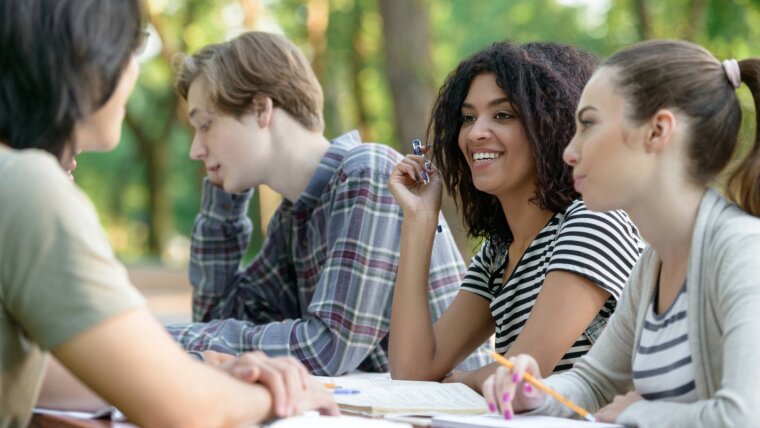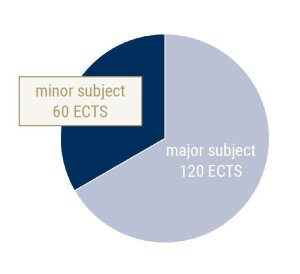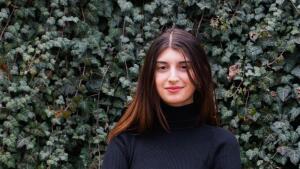
- Degree
- Bachelor of Arts
- Supplement to degree
- minor in a multi-subject bachelor’s programme
- Admission restriction
- without admission restriction (without NC)
- Duration
- 6 Semesters
- Credits/ECTS
- 60
- Teaching language
- German
- Tuition fee
- None
- Semester contribution
- € 305,05
- Start of studies
- Winter semester
- Part-time possible
- Yes
- Institutions
- Faculty of Arts
- German as a foreign and second language de
- Institute for German as a Foreign Language and Intercultural Studies de
Programme content
In this Bachelor's degree programme, you will learn a scientifically sound approach to German as a Foreign and Second Language as well as German culture as a foreign culture. You will acquire knowledge and skills in the following subjects) areas|field:
- Fundamentals of foreign and second language acquisition
- Basics of learning and teaching foreign languages
- Basics of language description and language teaching
- Intercultural communication and intercultural regional studies
- Literature and its teaching
- Media in foreign language teaching
- Didactics and methodology of foreign and second language teaching
- German as a second language at school and at work
Practical modules are also an important part of the degree programme, especially in the major subject. In a project-based application module, you will apply your acquired knowledge to the solution of a complex seminar task. You will also complete a practical module on observing, analysing, planning, implementing and reviewing lessons.
Structure
Multi-subject bachelor’s programme
Picture: Sophie BartholomeThe Bachelor's degree is the first professional qualification. The standard period of study|regular programme length is six semesters in total, during which various forms of courses (e.g. seminars, lectures or tutorials) are offered for the individual modules.
A multi-subject Bachelor's degree consists of a major subject with 120 credit points (abbreviation: LP / 1 LP = 30 hours of attendance, preparation and follow-up work|follow-up activity, learning and assessed coursework and examinations) and a supplementary subject with 60 LP.
How might your degree programme shape up?
The following table shows you an example of the programme structure for the supplementary subject »German as a foreign and second language«:
| 1ST FS | 2ND FS | 3RD FS | 4TH FS | 5TH FS | 6TH FS |
| Fundamentals of learning and teaching foreign languages (10 CP) |
Required elective module* (10 CP) |
||||
| Required elective module* (10 CP) |
|||||
| Fundamentals of language description (10 CP) |
|||||
| Culture: Regional Studies, Literature and Intercultural Encounters (10 CP) |
|||||
| Foreign and second language teaching: Methods and skills (10 CP) |
|||||
Abbreviations: CP = credit points (ECTS)|ECTS credits
* The following modules are available to choose from: Language Memories: Vocabulary, grammar and their teaching; Media in foreign language teaching and German as a second language at school and at work.
You can find more detailed information in the module catalogue for the degree programmeExternal link.
Why study in Jena?
- The Institute of German as a Foreign and Second Language and Intercultural Studies is one of the leading institutes of its kind in Germany with numerous and diverse international co-operations. It is characterised by the breadth of its tenders as well as the high standards in its research and application-oriented focus areas. These include, in particular, dealing with questions of second language acquisition in the "Department for German as a Second Language" and with questions of teaching material development in the "Department for Teaching Material Research and Development (ALM)". The institute offers its students a productive combination of academic and practical content, a stimulating study atmosphere with fellow students from different countries and cultures, a comprehensive range of support services and an infrastructure with short distances.
- Unlimited possibilities: Experience internationality! The university attracts students and academics from all over the world with its attractive conditions and characterises Jena as a future-oriented and cosmopolitan city - ideal requirements for prospective international studentsmp4, 57 mb · de.
- Adventures abroad: You can easily fulfil your dream of a semester abroad de. Our university has a worldwide network of partner universities.
What can you do after your studies?
Career opportunities:
The main professional fields of application of the supplementary subject German as a Foreign and Second Language are defined by the major subject chosen. The additional qualifications acquired in the supplementary subject are thus understood as an extension of the professional opportunities in the major subject.
Downloads and links for the degree programme
What are we looking for in prospective students?
- Interest in working abroad or in a second language context in Germany
- Willingness to engage with German and foreign languages and cultures
- Foreign language skills
- Curiosity about questions of language acquisition and language teaching
Admission requirements
-
University entrance qualification
A university entrance qualification, such as a general secondary school leaving certificate, is required for admission onto the study programme.
More information on university entrance qualifications can be found here.
-
Language requirements
English and another modern foreign language (A2 level); proof by the time of registration for the Bachelor's thesis at the latest
Contacts
Room 510
Ernst-Abbe-Platz 8
07743 Jena
Google Maps site planExternal link
Opening hours:
nach Vereinbarung
Bachstraße 18k
07743 Jena
Telephone hours:
Mondays and Fridays (9:00 – 11:00)
Wednesdays (13:00 – 15:00)
The ASPA is primarily responsible for students in the Faculty of Social and Behavioural Sciences, the Faculty of Arts and Humanities, and the Faculty of Theology.
Postal address:
Akademisches Studien- und Prüfungsamt
Fürstengraben 1
07743 Jena
Ernst-Abbe-Platz 8
07743 Jena
Google Maps site planExternal link
University Main Building / SSZ
Fürstengraben 1
07743 Jena
Google Maps site planExternal link
Office hours:
We offer consultations in person, by telephone, and via Zoom. You can make an appointment by calling us on +49 3641 9-411111 (Mondays to Fridays from 9:00 to 11:00) or outside these office hours on +49 3641 9-411200. You can also use our remote help desk.
Consultation hours:
Mondays, Tuesdays, Thursdays and Fridays (9:00 to 12:20), Tuesdays (14:00 to 18:00), and Wednesdays and Thursdays (14:00 to 16:00).
Video chat: To the video chat – Zoom Videochat ZeitenMondays to Fridays (12:30 to 13:00) Password ZSB2020 Data protection informationpdf, 101 kb
University Main Building, Room E065
Fürstengraben 1
07743 Jena
Google Maps site planExternal link
Opening hours:
Information Desk (UHG; Room E0.65)
Mondays (10:00 – 12:00)
Tuesdays (13:00 – 15:00)
Wednesdays (10:00 – 12:00)
Thursdays (13:00 – 15:00)
Fridays (10:00 – 12:00)
You can also use our remote help desk at
www.uni-jena.de/service-ssz
or send us your enquiries by post.
Telephone hours:
Mondays to Fridays
(9:00 – 11:00)
Postal address:
Friedrich-Schiller-Universität Jena
Studierenden-Service-Zentrum
07737 Jena
University Main Building
Fürstengraben 1
07743 Jena
Google Maps site planExternal link

